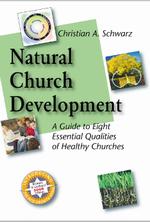Church Leadership
Tools For Revitalisation
- Details
- Written by: Mark Simon
National Church Life Survey

Many Anglican churches in Australia have participated in the NCLS (most recently undertaken in 2021). NCLS has 9 core qualities that measure church vitality: 1 alive and growing faith, 2 vital and nurturing worship, 3 strong and growing sense of belonging (these three are grouped as internal qualities); 4 a clear and owned vision, 5 inspiring and empowering leadership, 6 openness to imaginative and flexible innovation (grouped as inspirational qualities); 7 practical and diverse service, 8 willing and effective faith-sharing, and 9 intentional and welcoming inclusion (grouped as outward qualities). Completing the NCLS gives a church leadership team some quantified measures of health in each of the core qualities.
NCLS provides notes and a suggested planning process for addressing weak core qualities at https:// www.ncls.org.au/articles/act/. This process is based on ‘appreciative inquiry’ and assumes that reflection on the church’s past, combined with a shared new vision, followed by strategy and implementation steps, will yield positive change. I’m not convinced. The NCLS planning materials are fairly thin on biblical priorities for church life and mission, and in trying to appeal to any Australian church from any tradition and any denomination, they feel too openended and theologically vague. Evangelical Anglican churches would likely seek a stronger ecclesiology and missiology (such as that found in Tim Keller’s Center Church, and which is incorporated into City to City Australia’s Church Revitalisation consultancy process).
 Natural Church Development
Natural Church Development
Like NCLS, Christian Schwarz’s Natural Church Development (ncd-australia.org) uses a survey tool filled in by church attenders to produce a report on a church’s health. NCD has eight quality areas: empowering leadership, gift-oriented ministry, passionate spirituality, functional structures, inspiring worship services, holistic small groups, need-oriented evangelism, and loving relationships. NCD is better than NCLS at providing resources and strategies to address a church’s ‘minimum factor’ – that is, the area which scores lowest on the 8 health characteristics.
There is a series of books with titles beginning ‘The 3 Colors of…’ which each address gifts, community, spirituality, ministry, etc and provide tools to improve church health in that domain. NCD presupposes a pattern of Sunday services and mid-week small groups as the engine room of church life, and this would be familiar to most evangelical churches. Therefore, it won’t yield revolutionary change in ministry shape or priorities. Notwithstanding its conventionality, NCD has established itself as a reliable tool for church revitalisation.
 Mission-Minded
Mission-Minded
Peter Bolt
Kingsford: Matthias Media, 2000
This brief book (70 pages) is short enough for every parish council member and ministry leader in the church to read and act on in one week. It provides a simple tool (a one page table) that leaders can quickly fill in to evaluate the extent to which the church’s current activities are contributing to evangelism or edification (with 3-4 stages specified under each broad goal). The tool enables a church to quickly see why it is not growing through conversions or not growing in spiritual maturity or in ministry impact. Mission-Minded can help a leader start a revitalisation process with some straight-forward analysis and a clear strategy for improving churches stuck in maintenance mode.
Church Revitalisation through Digital Technology
- Details
- Written by: Evan Englezos

 Evan Englezos (Digital Team Coach and Digital Ministry Hub, left) interviews Jackson king (Digital and Music Ministry Support, Robina Anglican Church, right)
Evan Englezos (Digital Team Coach and Digital Ministry Hub, left) interviews Jackson king (Digital and Music Ministry Support, Robina Anglican Church, right)
The COVID-19 pandemic, with its associated lockdowns and meeting limits, accelerated the use of digital technology in many churches. Many of these changes were hastily implemented during 2020-2021. The challenge and focus now is to make the most of new digital technologies to invigorate the church toward revitalisation.
Jackson King from Robina Anglican Church has generously shared his experience and observations of the role of digital technology as an encouragement to his brothers and sisters in ministry.
EVAN: WHAT DID THE DIGITAL SPACE LOOK LIKE WHEN YOU JOINED IN 2020?
Jackson: The digital space for Robina Anglican was nowhere near as imperative as it is now and during COVID-19 lockdowns. Pre-COVID, we had a functioning website, a social media presence, printed bulletins and online communications with members. During COVID we needed to redesign our whole communication strategy. We also needed a live streaming system that was easy to use and produce content with. We’ve made progress through trial and error, experimenting with both software and hardware solutions. We see a need for continual change in the year ahead.
EVAN: WHAT DOES DIGITAL TECHNOLOGY LOOK LIKE NOW?
Jackson: We now have a more integrated system where Planning Center Online provides a central, online hub for member data, events, check-ins, calendar, and service planning. We have a live streaming system that is smooth and easy to run on a limited budget. We’ve settled on The Church Co to create a new look for our church’s website and integrate with Planning Center Online. All our digital functions are more integrated and streamlined.
EVAN: WHY IS DIGITAL TECHNOLOGY IMPORTANT FOR THE REVITALISATION OF THE CHURCH?
Jackson: In one sense, COVID-19 was a blessing since it helped us understand how digital ministry can serve a lot of people. We have a lot of parishioners in our community who are immuno-compromised. Travelling out in a COVID-rampant world wasn't ideal for them and they still needed to be part of a spiritual community. With the revitalisation of digital space, we found that we were able to connect with people in all stages and could meet them where they were comfortable.
From a staff point of view, although it's nice to think that everyone can come here, through an online platform we can go to them where they are comfortable in their own homes. There are people in places all around the world who are wanting to receive content and find something that suits them. The digital space allows them to do that more quickly and efficiently, and do it from the comfort of their own home with their families. Digital platforms enable us to spread the good news to people who physically can’t come to us. Churches that revitalise their digital space are going to help more people. It's going to help more people feel connected to God, to the community, and to their families and it's absolutely imperative.
EVAN: HOW DO YOU MEANINGFULLY ENGAGE AND CONNECT WITH THEM AND HELP THEM HAVE A COMMUNITY WHEN THEY CAN'T PHYSICALLY CONNECT WITH YOU? HOW DO YOU OFFER THAT SENSE OF COMMUNITY WITH THEM?
Jackson: We have tried a multitude of approaches! At the moment, our key tool is called Church Online Platform which we use to livestream our services. It has chat functions, private prayer, online giving and many more features. The best thing is that it’s absolutely free.
Zoom was great during COVID-19. It helped to maintain community but there were limitations with reaching new people and moderating so many people with cameras and microphones. Church Online Platform helps to extend our reach and improves the quality of interaction by offering small and big steps for wherever people are at. Some people tune in from half an hour’s drive away, others are an hour and a half ’s drive away, and even a few from other continents. We’re thrilled at how this system brings people together and creates community.
Our previous experiences with Facebook Live and YouTube were okay. We found that there was limited communication and connection with those who joined online. By making the Church Online Platform our primary livestream platform, we could make better connections with this online community.
EVAN: HOW DO YOU HELP PEOPLE TO FIND AND ACCESS YOUR CONTENT?
Jackson: We’re continually trying to improve our communication. At the moment we're posting a lot of bible study resources on our websites. All of our sermons get edited and trimmed and republished as videos (hosted through Vimeo) on our website. We also have podcasts so content can reach people in a way that suits them. They feel spiritually connected by hearing the word and some commentary on it.
Social media is useful too. We do a lot of cross-platform promotion. We upload a sermon as a podcast or video, share that on Facebook, post an image on Instagram with all the links that they need. We promote this during the service for people and point them towards our website Resource page. On average, I spend 10 hours per week adding and monitoring content on all our social platforms. We don’t want multiple people posting content and so overwhelming viewers with mixed priorities, overlapping content or inconsistent quality. The goal is to make it as simple as possible for our viewers.
It's all about creating the simplest pathways for people to access those resources and promote it well so they can see
them.
It takes time to set up the pathways and the workflows but when we make it easier they're more inclined to come back and continue to connect and that's all we want.
EVAN: HOW CAN YOU MEASURE THE EFFECTIVENESS AND THE FRUITFULNESS OF ALL THIS DIGITAL TECH WORK?
Jackson: Raw numbers can be disappointing, but individual stories encourage us. We recently had a woman watch our service on Facebook, then she joined us on Church Online Platform and started chatting with us there, but left before the end of the service. She tuned in a couple more times then actually started to attend in person.
The digital space has largely replaced church foyers. People use online search engines to find churches near them, and preview the church experience through their online content.
Last week, a young woman from Canada moved here to study. She searched Anglican churches in our area and found us and three other churches within a 20 minutes drive. We met at our office and she is now interested in being a part of our church. That's all because we had an effective digital presence in online ministry.
We may not get the same numbers online as we do in person.
We care about fostering connection with individuals, or two or three people.
Evan: Can other churches start to replicate some of these simple pathways and workflows that you've been setting up?
Jackson: Definitely! Social media is a great tool for reaching people because that’s where many people are today. Most churches have websites. They can create resource pages and link a Word document or PDF with some reflection questions. These resources can be promoted on a Facebook page, which expands their reach.
We produce a weekly email newsletter and blog article.
There's a big button in the newsletter that takes subscribers straight to the blog. Again, we share that on Facebook, and through our website. It’s two clicks to get to the blog. For all our content, we aim to make it as easy as possible for different groups to access it. For example, how can Linda, who lives in a retirement home and gets access to the computer once a week, access the sermon?
Or how do we make it easy for Ben who is a Year 12 student, who loves listening to podcasts while he goes to the gym? Two different people in two very different scenarios, can both access our content in two clicks.
An easy and effective way for many churches to expand their digital reach is through links on social media platforms and promotion in email newsletters.
Intentionally target the types of communities you want to reach.
EVAN: IT TAKES TIME AND INTENTIONALITY TO SET UP AND MAINTAIN THESE SYSTEMS AND WORKFLOW. REALISTICALLY, WHAT IS REQUIRED TO GET THE DIGITAL MINISTRY OFF THE GROUND AND RUNNING EFFECTIVELY?
Jackson: Given the limited skills and time resources you have from both staff and volunteers, it makes sense to pay specialists for things like building and maintaining a website. We are now using a company called The Church Co for our website design and maintenance. It is tailored for churches and has features including sermons, podcasts, age-specific groups, weddings, baptisms and so on. Almost all of our media (photos and videos) for our website is taken by staff and parishioners.
The best websites I've seen are the ones that have fewer words on their homepages. Most people won’t read multiple paragraphs about everything that goes on. We like to use lots of images and big bold titles. For example, “our services are at these times, here’s the directions to our church, watch the livestream here, if you have any questions call this number or contact us here.”
If you spend the time creating the communication and being available to answer questions based on that, the best church websites are simple, easy to navigate and easy to find.
EVAN: MOST CHURCHES DON’T HAVE A PAID STAFF MEMBER WITH DIGITAL SKILLS AND EXPERTISE LIKE YOU. IF A CHURCH HAD A VOLUNTEER WITH ONLY A FEW HOURS EACH WEEK TO FOCUS ON DIGITAL OUTREACH, HOW CAN THEY HAVE THE MOST IMPACT?
Jackson: The most impact comes from good communication with your congregation. Newsletter emails, social media, and letting people know directly what is going on is a great start. When people know what's going on, they feel like they are welcome to participate and contribute. For example, small groups and Bible studies, and communicating that across multiple platforms: Facebook, Instagram, and newsletter emails. The social media platforms help to increase participation and enthusiasm, and spreads into the wider community in person and online.
To save time for posting and moderating, we use Meta Business Suite (which is free) to simultaneously work on Facebook and Instagram. There are lots of email newsletter tools. We have used subscription services including Mailchimp and Campaign Monitor and they’re both really good.
With all this, persistence and consistency is really important. We’ve had lots of roadblocks and made mistakes, but we are driven by our mission to reach people for Jesus. The digital space is a great opportunity to reach and engage people wherever they are. Work at understanding who you are trying to reach. Take the steps to make it easy for them to find you and access your content and create workflows that will make it easy for you to produce and share your content.
Evan Englezos Director of Digital Team Coach and Digital Ministry Hub - digitalteamcoach.com, digitalministryhub.com
Jackson King Digital and Music Ministry Support, Robina Anglican Church - robinaanglican.com
Resources mentioned - There is no affiliation to any of these resources;
thechurchco.com
www.planningcenter.com
churchonlineplatform.com
www.facebook.com/business/tools/meta-business-suite
mailchimp.com
www.campaignmonitor.com
Church Revitalisation in Tasmania
- Details
- Written by: Joel Nankervis
 Joel Nankervis is the minister of Circular head Anglican church, Tasmania. Mark Simon spoke with him about revitalising the church.
Joel Nankervis is the minister of Circular head Anglican church, Tasmania. Mark Simon spoke with him about revitalising the church.
Mark: how would you describe the state of the parish when you commenced?
Joel: The church is based in Smithton, in the far northwest of Tasmania. The town’s population is 4000 people. The main industries are farming, fishing and forestry. The town has an ‘end-of-the-road’ feel to it since there’s wilderness to the south and nothing but ocean to the north and the west. Many residents of the town and surrounding areas have historically been part of the Brethren church, and more recently, Pentecostal churches have emerged, as well as those who identify as Anglican. But many of these Christians of whatever background had become disconnected from church life.
Focusing specifically on the Anglican parish, when I began in 2017, it had been 20 years since the previous stipendiary minister. Circular Head was an Enabler Supported Ministry for those 20 years. Under this model, a local team was raised up of leaders, including 1-2 locally ordained people, and this team was supported by a trained member of clergy called an Enabler, who covered 3-4 parishes. This model operated for around 20 years in Tasmania but has now ceased across the parishes that were using it. The local leaders had become quite tired after the years of doing ministry this way. The congregation had dwindled to around 20 people.
Some Lessons from Revitalise Australia
- Details
- Written by: Rod Morris
 In February 2022 I took the step of concluding 13 years of parish leadership and moved into a new role as a Church Revitalisation Consultant with City to City Australia (CTCA). Under God, it seemed like a good way to bring together the various aspects of my ministry over the past 35 years and apply them in a way that would be a blessing to the wider church.
In February 2022 I took the step of concluding 13 years of parish leadership and moved into a new role as a Church Revitalisation Consultant with City to City Australia (CTCA). Under God, it seemed like a good way to bring together the various aspects of my ministry over the past 35 years and apply them in a way that would be a blessing to the wider church.
CTCA has been active in supporting church planters in Australia over a number of years. As part of this work they have developed training resources for planting healthy churches and gained expertise in ministry coaching to support church planters as they get established. In 2022, we have had the great privilege of working alongside over 40 church planters as they have established new churches. A number of these are Anglican churches, but we happily work with anyone who can affirm an orthodox confession of faith such as the Westminster confession, the Heidelberg catechism, or our own Thirty Nine Articles and the three historic creeds of our Prayer Book.
In 2021 CTCA took the step of moving into the realm of church revitalisation, and as I write this article in late 2022, we are working alongside over 60 churches across denominations and around the country. This work involves either a full church revitalisation project, or a specific intervention such as coaching, relational evangelism training, or a ministry vision workshop.
Our highest profile revitalisation project on the Anglican stage is with Bishop Richard and the Multiply Tas program, but we have also been working with the Diocese of Canberra Goulburn, parishes within Newcastle, Adelaide, Bendigo, the Northern Territory, and Perth, and churches within the Diocese of the Southern Cross. Personally, this year I have had the great privilege of working with twenty different churches across Victoria, Tasmania, NSW, ACT, Queensland, and the Northern Territory. My projects included three specific coaching relationships with other Anglican clergy, eight church vision workshops with Anglican, Presbyterian, Baptist, Brethren, and Independent churches, and thirteen ongoing revitalisation projects with a range of Anglican,
Presbyterian, Church of Christ, Wesleyan Methodists and independent churches. It is exciting to see what God’s people are doing in so many different contexts to see the gospel of Christ move forward.
Revitalise Australia
The full church revitalisation program with CTCA has three phases. The first is a health check and assessment of the current state of a church’s ministry. We visit the church’s Sunday services of public worship, and we assess the church’s facilities and their suitability for purpose. We meet with parish leaders to identify the current strengths and weaknesses of the church, as well as the opportunities and threats laying ahead. There is a 360 degree review of the minister’s leadership using the Christian Leadership Framework to assess their capacity for leading change, and there is a survey of church members to gain feedback on church health and life. We also gather existing data and reports such as annual meeting reports, NCLS results, vision statements, financial reports, parish publications, ABS census data, and whatever else the church has available that helps us understand their ministry and context.
The second phase is the writing of an extensive report in which we consider the church’s mission, vision, and values; their ministry systems for engagement, integration, and maturity; the infrastructure, governance, and operating systems; their church culture; and then we make some recommendations about how the church might move forward in their ministry. Phase three is then a year long journey in which we work alongside the minister and the church to help them implement the initiatives suggested.
Emerging themes
At this stage there are a number of themes clearly emerging across the churches that we are working with. The first is the stark reality of demographics. The churches are each significantly older than the communities they serve, often with a difference of well over 15 years, and there is a clear lack of young families, youth, and children across the churches. This clearly indicates that the churches should focus on developing their ministry to families as a priority. The clock is ticking, and time is running out!
An ageing congregation, often with limited incomes, means there is a real threat of churches becoming unviable, either financially or numerically. However, there is also a common concern that emphasis on recruiting new and younger members may result in existing and older parishioners feeling either overlooked or neglected.
There are too few doing too much, with few people having the energy or capacity to step up as volunteers, and as a consequence the churches are offering limited ministry options to their communities. There is a clear risk of the church spreading themselves too thin with a small pool of volunteers struggling with tiredness, ageing, busyness, and post-Covid residual exhaustion. It may be that Covid will prove to be a blessing in that it has enabled churches to stop lots of extraneous activities, and hopefully churches will be wise in what they restart.
Much of the load falls onto the minister, and church members are generally content with the clergy and staff they have serving. Whilst the ministers each have their own strengths and weaknesses, together with their corresponding professional development needs, they are generally suitable for the ministries they lead.
There is an identifiable sense of dissatisfaction with the support offered within most dioceses as it does not seem to clearly facilitate and enable ministry to flourish. People are feeling swamped by the legal and administrative requirements for ministry, and whilst these are recognised as necessary, they seem secondary to core ministry tasks.
Whilst the Sunday services conducted in various churches differ according to their liturgical and theological traditions, they are generally appropriate to their context and the existing congregation so there does not seem to be a great need to change existing services. But at the same time, there is the glaring problem that these services fail to engage with younger members of the community.
There is a pressing need to initiate new services that are more accessible for families and non-churched people. Consequently, almost every church needs to focus on initiating these new services. Whilst some churches have specific legacy issues related to historical abuse which clearly undermine their reputation within their community, people are generally cautious about doing church things following the Royal Commission and there needs to be deliberate attention in restoring the church’s reputation as a safe place.
A common theme is a lack of vision and the absence of a clear sense of where the church might be in five years and the steps needed to get there. I have already decided that this lack of vision and the consequent sense of being stuck in maintenance mode is actually definitional to church stagnation. Consequently, developing an easily shared vision and defining ministry pathways seems to be a priority with each parish. Churches are in maintenance mode rather than missional mode and none of the churches have an easily communicated vision of where they believe God is taking them over the next five to ten years. CTCA are addressing this issue using a vision workshop which helps the church identify where they think God is taking them and the steps needed to make that vision a reality. It is an effective tool and I think the power of the workshop is that it gets the key leaders within the church to develop an agreed sense of what they should be doing, and where they are going.
Similarly, churches do not have well-developed systems for engagement with the community, integration into the life of the church, or for producing spiritual maturity. They are generally just doing what they always have done, and there is little sense of intentionality within the church’s practice. Sadly, amongst the churches needing revitalisation there is real enthusiasm and openness to exploring new ways of using facilities to generate income, but not an equal enthusiasm for exploring new ways to use facilities to initiate ministry. Churches are running midweek ministry programs for families and engaged with community support programs such as op shops, food banks, and emergency relief, but there are few functioning pathways between these ministries and the worshipping community. Consequently, they each need to explore and define the way in which they engage with their community in outreach, integrate contacts and new members into the worshipping life of the church, and to a lesser degree, how they help people grow to spiritual maturity.
There is a general expectation that outsiders need to take the initiative in connecting with the church and there seems to be a degree of spiritual passivity, introversion, introspection, and a cultural cringe about evangelism across the churches. Most communities would not notice if their local parish closed down. There is a clear opportunity to grow the church’s profile within the community by owning our identity and developing clearer strategies for community engagement. CTCA is addressing this specific need with the ‘Ripple Effect’. Julie-Anne Laird, who is a Lay Canon for Church Planting in the Diocese of Melbourne, has developed this material together with Sam Chan and we are seeing churches enthusiastically embracing this combination of whole church training workshop, small group resources, and assistance with developing an understanding of the local community.
Ten steps to help revitalise your church
- Check the pumping heart of gospel clarity within your church. It doesn’t matter how slick your ministry is if you’re not proclaiming Christ and helping people grow to Christian maturity.
- Rally the troops to pray. It is God’s church, and He is the one who brings about church revitalisation.
- Develop clarity of your vision and identify the steps for moving forward over the next 5 years.
- Audit the existing core ministry systems of your church and check their effectiveness in engaging the community, integrating people into the life of the church, and growing to maturity as disciple making disciples of Jesus. Especially check your Sunday services and their effectiveness as the shop front for your ministry.
- Conduct a local community study in order to develop a community profile and understand your ministry context and how you might engage meaningfully with those you serve.
- Create a disciple-making culture and work on equipping people to effectively share the gospel.
- Mobilise your members for ministry by helping them identify their gifting and find areas for ministry service.
- Develop a leadership pipeline that helps people be disciple-making disciples.
- Identify and deal with any specific problems, the skeletons in the cupboards and elephants in the room, which may be having a detrimental impact on your church.
- Ensure there is ongoing support and encouragement for the Senior Minister.
Rod Morris is a Lead Consultant within the Revitalise Australia program with City to City Australia.
The Great Collapse
- Details
- Written by: Stephen Hale
 One of the challenges we are all living with is the reality that many churches will close in the next decade. It gives me no pleasure to say this, but it is a reality that is upon us. Every diocese in Australia has a cohort of churches with very small numbers and mainly elderly parishioners.
One of the challenges we are all living with is the reality that many churches will close in the next decade. It gives me no pleasure to say this, but it is a reality that is upon us. Every diocese in Australia has a cohort of churches with very small numbers and mainly elderly parishioners.
Sooner or later these churches reach a point of unviability. In saying this I’m not stating anything new. We’re all familiar with these situations. The ramp up of multiple compliance requirements in the past decade and the two years of pandemic have accelerated the situation.
The thing that is new will be the scale of the problem. Many of these churches have been clinging on for many years and it’s remarkable that they have gone on for as long as they have. Most of these churches are within the Anglo Catholic/Traditional side of the Anglican Church but it isn’t confined to this tradition. As a clear sign of the challenge of our reality it was reported at the most recent Melbourne Synod that over 50% of parishes have no children in attendance!
In God’s providence the counter to this is that many new churches have started in the past decade and there will be many more new churches in the years ahead. More especially we are being greatly blessed by the birth of many language-specific (non-English speaking) faith communities which often see significant growth. At the most recent ordination in Melbourne the number of ordinands was 10 to 5 in this direction!
I believe that it is easier to start a new church than to renew an existing church. Existing churches have many challenges and ministers who are appointed to them are often seeking to achieve twin outcomes. They are seeking to sustain a traditional service with a group with high pastoral needs, while simultaneously birthing something new. It can be done, but it’s a tough gig. While there are lots of great examples where this has led to the birth of something new, there are also many ministers who have been burned along the way in places where it has been too hard, and it hasn’t happened.
So, what should we do? Is this a disaster or is it an amazing opportunity? The comments in this article are more applicable to our metropolitan and provincial cities.
The challenges in remote rural areas are great and I don’t claim to be an expert in that area. I give thanks for and pray for BCA and the remote rural bishops regularly.
The worst-case scenario is that we do nothing intentional and allow church after church to die with nothing to replace them. This would be tragic. There needs to be an intentional diocesan strategy. Without a strategy, more often than not the Assistant Bishops in the larger dioceses are put into an impossible position. They are left to deal with church after church facing similar scenarios and burning huge numbers of hours with no clear framework for addressing it. Bishops are often obligated to find clergy for too many unviable churches and it is proving to be increasingly challenging to find them. A growing number of parishes have had a rolling series of locums for years.
In broad terms I would suggest we are asking too many clergy to go to too many Parishes that are too far gone, and the consequences aren’t great for anyone! While church renewals can and do happen, it is unrealistic to expect them to happen in multiple places simultaneously.
Another scenario is the cobbling together of churches that are within some proximity to create a basis for a fulltime minister. This model can work, but only if there is clear intentionality about how it might work. Without that this is often a recipe for significant tension and conflict.
It’s not much fun leading two or three centres all of which are in a similar scenario and all of whom want the minister between 9am and 11am on a Sunday morning.
Another worst-case scenario in all of this is that progressively over time properties are sold and dioceses build up their central reserves to buffer against abuse payouts. The diocese is an organising entity not the church and the role of the diocese is to support the church to grow, not to protect itself.
The closure of churches does free up assets that can be used to:
- create a church planting fund to assist in the planting of new churches.
- more fully support the birth of many more culturally-diverse (non-English speaking) congregations.
- intentionally partner with the medium size and larger churches to invite them to take over dying churches with a view to planting new congregations. The church planter is then a part of a team as well as having the back-up of a stronger church.
- facilitate the closure of a few churches within proximity with a view to the sale of one or more of the sites and the building of a new centre with contemporary facilities. I spoke at a Uniting Church last year where 5 churches had agreed to close and amalgamate and come together on an existing site with all sorts of allied activities happening with several Sunday congregations.
- buy land for new outer suburban and inner urban plants.
To navigate these and many other changes bishops need to be honest about the reality of where we are at. Alongside of that they need to offer a fresh vision of what is possible and actively support those who are seeking to make that a reality.
Bishop Stephen Hale is Chair, EFAC Australia and EFAC Global.
